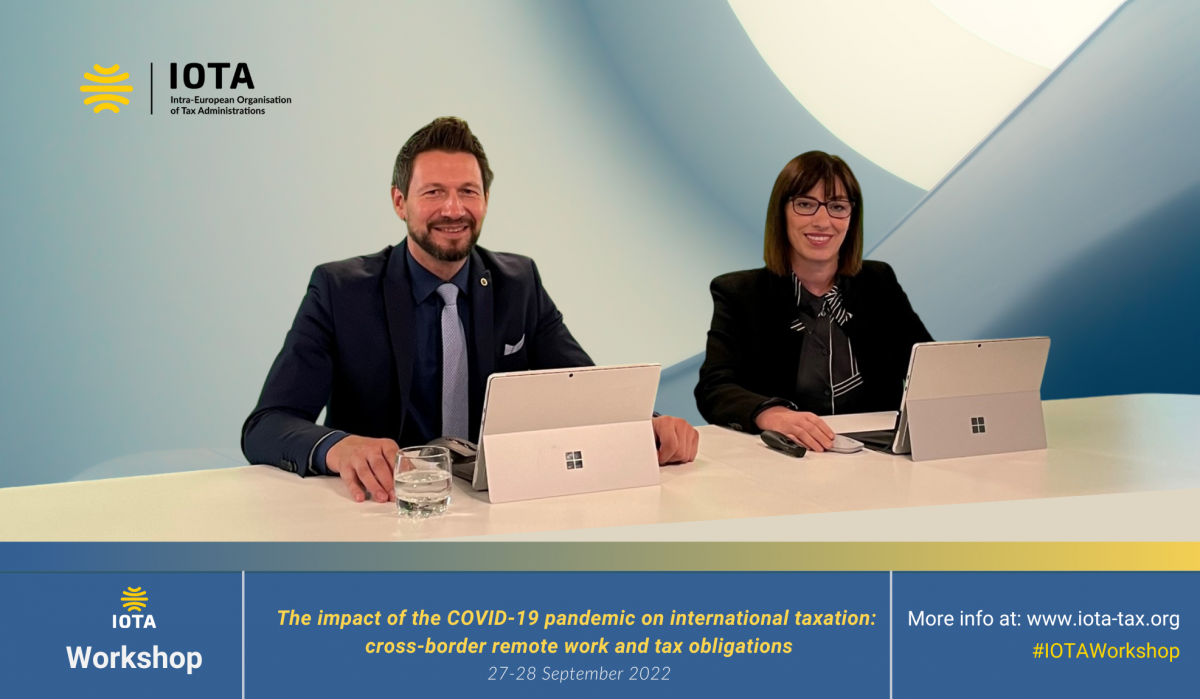IOTA is pleased to announce that the Organisation successfully held its latest Workshop on the Impact of the COVID-19 Pandemic on International Taxation: Cross-border Remote Work and Tax Obligations on 27th-28th September 2022. The two-day digital event was broadcasted live from the IOTA Studio in Budapest and welcomed more than 80 attendees from 24 IOTA member tax administrations along with speakers from IOTA member countries, the Organisation for Economic Co-operation and Development (OECD) and the European Commission (DG TAXUD), who virtually came together to explore country examples of how certain IOTA members addressed the impact of COVID-19 on the employer's taxation and the employee's residence situation in connection with cross-border teleworking opportunities.
Furthermore, the Workshop focused on how the tax administrations need to prepare and adapt to the new cross-border remote working models, prevent non-taxation or double taxation of remote workers, and ensure fair treatment in the application of double taxation agreements. The digital event also offered an opportunity for tax administrations to share the changes in national regulations, procedures, and digitalisation of processes, required for adaptation to the new tax compliance environment.
The first plenary session of the event started with an overview of the OECD guidance issued on tax treaties and the impact of the COVID-19 pandemic where Olivia Long and Gabriela Capristano from OECD delivered the “Tax treaty and transfer pricing aspects of cross-border remote work and the OECD’s COVID-19 guidance” presentation.
During the second plenary session the speakers such as Olivia Long and Gabriela Capristano from OECD as mentioned above, Gyöngyi Siklósi Antal from the National Tax and Customs Administration of Hungary along with Alessandro Maurer from the Swiss Federal Tax Administration and Bastiaan Didden from the Dutch Tax and Customs Administration, debated on the main challenges in taxation of cross-border workers that tax administrations faced during the Covid-19 pandemic crisis, including the tax compliance risks, and how they overcome these problems.
The topic of the first day’s last plenary session revolved around the impact of the COVID-19 pandemic crisis on determining the permanent establishment, focusing on:
- “Local solutions for a global problem” presented by Alessandro Maurer, Switzerland
- “Interpretation of tax treaties under COVID-19 in Hungary” presented by Gyöngyi Siklósi Antal, Hungary
- “Permanent establishments from a Dutch point of view” presented by Bastiaan Didden, The Netherlands
On the second day of the Workshop, the speakers shared their country's practice relating to the enhancements made in the procedure for the issuing of tax residence certificates including the presentation “Determining the permanent establishment and the residence during the pandemic: the Greek example” delivered by Ioannis Tetagiotis & Katerina Perrou from Greece. The theme of the next plenary session ran under the adaptation of national regulations, procedures, and digitalisation of processes where Leticia Escribano & Begoña De Hoyos Maroto from Spain presented “The Spanish Tax Agency´s Electronic Tax Residence Certificates”.
The last plenary session of the event provided the participants with a great opportunity to gain insight into the EU’s perspective on cross-border remote work and tax obligations where Albert Raedler from the European Commission reflected on the topic with his presentation “Cross-border Remote Work and Tax Obligations”. Moreover, the speaker shared the EU perspective on the impact of the Covid-19 pandemic on frontier workers, in particular with regard to cross-border teleworking.
The attendees of the Workshop could raise questions during the Q&A at the end of each Session. In addition, participants were actively involved in group discussions and a panel debate during the two days of the event.
The presentations are available for registered IOTA website users on the event’s webpage while the recording of the event will be provided soon.

